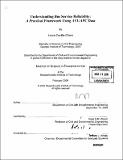Understanding bus service reliability : a practical framework using AVL/APC data
Author(s)
Cham, Laura Cecilia
DownloadFull printable version (23.59Mb)
Other Contributors
Massachusetts Institute of Technology. Dept. of Civil and Environmental Engineering.
Advisor
Nigel H.M. Wilson.
Terms of use
Metadata
Show full item recordAbstract
Service reliability on a transit system can have significant impacts on its provider and both existing and potential users. To passengers, unreliable service affects their perception of service quality and transit utility compared to other mode choices, while to transit agencies, this translates to loss of ridership and revenues and higher costs to provide additional service to compensate for poor service operations. The introduction of technologies such as Automatic Vehicle Location (AVL) and Automatic Passenger Counters (APC) provides the opportunity to gather large sets of data at relatively low cost and evaluate service to improve performance, schedule planning and operations control. This thesis presents a comprehensive review of key elements of service reliability, focused on the measures of reliability, the causes of unreliability and the application of strategies to improve service. The most significant causes of service reliability are presented: deviations at terminals, passenger loads, running times, environmental factors (or externalities) and operator behavior. Each is reviewed in terms of how they impact service and the complexities and interrelationship between different causes are explored. Also reviewed are the potential preventive and corrective strategies, and the links between the causes of service unreliability and best strategy according to the source of problems. A practical framework is developed to assess service reliability, exploring the uses of Automated Data Collection (ADC) systems to characterize service reliability and evaluate the causes of unreliability that may exist. Its goal is to serve as a guide for transit agencies to begin to analyze the large sets of data available from these systems to evaluate performance and implement efficient strategies to improve service planning and operations. The proposed framework consists of three blocks: 1) characterization of service reliability through service measures and performance reports; 2) identification of causes of reliability problems; and 3) selection of strategies which target critical causes of unreliability to improve service. Characterization of service reliability involves examining five key elements an agency should analyze: a) data inputs, b) output calculations, c) service measures, d) threshold values, and e) performance reports. Identifying the causes of unreliability includes two sequential processes to infer the causes of service reliability problems. The first focuses on deviations at terminals, because good on-time performance and headway adherence is expected at the terminals and deviations at this point tend to propagate down the route and create further reliability problems. The second process examines deviations at other points on the route, and follows a set of steps to infer the causes of unreliability: initial deviations at terminal, passenger loads, poor schedule planning, operator behavior and externalities. Application of strategies includes an assessment of the best strategies to prevent reliability problems and reduce the impacts on service performance, based on the results of the previous analysis. The application of the proposed framework on the Silver Line Washington Street in Boston (MA) revealed that variability of running times and headway distributions are high. This indicates that bus arrivals and passenger wait times on this route are unpredictable and travel times are irregular. As a Bus Rapid Transit route, which is suppose to provide bus service with rail transit quality, headway adherence is poor on this route, with a tendency for buses to bunch together or leave gaps in service. Further analysis revealed that service reliability has recently deteriorated as a result of the implementation of a new Automatic Fare Collection (AFC) system. The new fare collection system presented delays in the boarding process, which resulted in increased travel times and passenger wait times. The main cause of service unreliability on this route was identified to be deviations at the terminals. Trips are departing the terminal with poor headway adherence (and therefore, poor on-time performance), which propagates and creates further reliability problems down the route. The causes of these terminal deviations were inferred to be a combination of poor terminal supervision and operator behavior. Recovery times, externalities and passenger loads at this terminal are inferred to cause only minor problems. At other points in the route, operator behavior and passenger loads are observed to affect reliability in the inbound direction. As for strategies to improve service reliability, emphasis is given to better supervision at the terminal. Supervisors at terminals are needed to enforce good operator behavior, balance headways, apply control strategies, and coordinate passenger loads to avoid poor departure headways and overcrowding of buses. Along the route, operator training, corrective strategies and traffic signal priority are highlighted as potential strategies to reduce the variability in running times and balance headways to reduce the occurrence of bunches and gaps in service.
Description
Thesis (S.M.)--Massachusetts Institute of Technology, Dept. of Civil and Environmental Engineering, 2006. Includes bibliographical references (leaves 141-142).
Date issued
2006Department
Massachusetts Institute of Technology. Department of Civil and Environmental EngineeringPublisher
Massachusetts Institute of Technology
Keywords
Civil and Environmental Engineering.